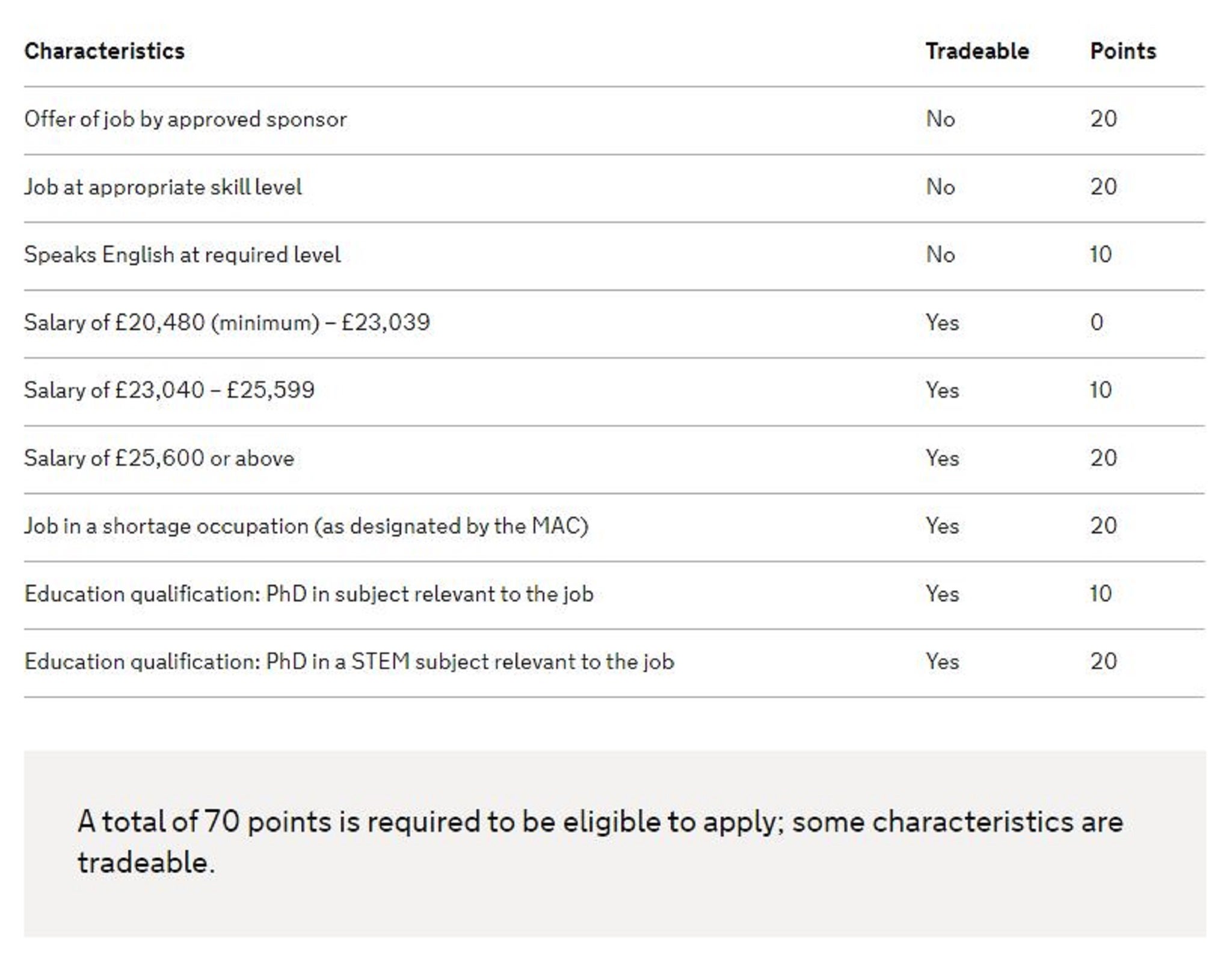What is in the government’s controversial new immigration plan?
Threshold of 70 points need to apply for visa under new rules
Your support helps us to tell the story
This election is still a dead heat, according to most polls. In a fight with such wafer-thin margins, we need reporters on the ground talking to the people Trump and Harris are courting. Your support allows us to keep sending journalists to the story.
The Independent is trusted by 27 million Americans from across the entire political spectrum every month. Unlike many other quality news outlets, we choose not to lock you out of our reporting and analysis with paywalls. But quality journalism must still be paid for.
Help us keep bring these critical stories to light. Your support makes all the difference.
The government has revealed a new points-based immigration plan which will come into force on 1 January next year.
Under the post-Brexit rules, free movement will be replaced by a minimum salary threshold of £25,600 for most workers – lower than the £30,000 proposed under Theresa May’s premiership.
It is hoped the “firm but fair” system will attract “high-skilled workers” to create a “high wage, high skill, high productivity” economy.
The Tories have vowed to prioritise people based on their skills rather than where they come from, adding: “For too long, distorted by European free movement rights, the immigration system has been failing to meet the needs of the British people.”
Migrants will be charged about £1,200 for a work visa, or £900 in a shortage occupation – the same fee as paid by non-EU migrants currently.
So what exactly is in the government’s controversial new immigration plan?
How many points do I need?
All applicants – both EU and non-EU citizens – who want to live and work in the UK will need to gain 70 points to be eligible to apply for a visa.
Points will be awarded for key requirements and they must meet three criteria, which total 50 points.
- Have a job offer from an approved sponsor, such as an employer cleared by the Home Office (20 points).
- Have a job offer that is at a “required skill level” (20 points).
- They can speak English to B1 level, enabling someone to, for example, open a bank account, or cope with “most situations” at home, work or leisure. (10 points).

How do I earn extra points?
Those who meet the first three conditions can then earn extra points to reach the threshold of 70 points by having:
- Salary between £23,040 – £25,599 (10 points)
- Salary of £25,600 or above (20 points).
- Job in an occupation where there are staff shortages, designated by the Migration Advisory Committee, such as the NHS, vets, architects (20 points).
- PhD in subject relevant to the job (10 points).
- PhD in a STEM (science, technology, engineering, maths) subject relevant to the job (20 points).
What about low-skilled workers?
There will be no temporary or general visa options for low-skilled migrant workers, other than seasonal workers.
The government has argued there are already huge numbers of EU citizens and 170,000 recently-arrived non-EU citizens for such jobs.
However, a pilot scheme for seasonal workers in agriculture will be quadrupled from 2,500 to 10,000 places.
What qualifications do I need?
The government has lowered the skill level required to count as “skilled” from graduate level to A-level.
What about students?
Students must be able “to support themselves” but will be able to stay on in the UK and work for two years after graduation.
They will need to demonstrate:
- They have an offer from an approved educational institution.
- Can speak English.
- Can support themselves during their studies in the UK.
Specialist occupations:
- Current arrangements for specialist occupations such as religious ministers, artists, musicians and entertainers are expected to broadly remain the same and be extended for EU citizens.
What if I’m self-employed?
Self-employed and freelance workers can continue to apply for visas under existing rules and will not need to be sponsored.
Do I need a visa to visit?
Visitors, including EU citizens, will be able to come to the UK without a visa for six months but will not be allowed to work.
What about asylum seekers?
Asylum applications fall outside the points-based system and are expected to operate under existing rules.
What if I'm not sponsored?
There will also be an “unsponsored” visa option where points will also be awarded for factors such as academic qualifications, age and relevant work experience for a small number of highly-skilled workers without a job offer. The route would be capped to begin with.
Subscribe to Independent Premium to bookmark this article
Want to bookmark your favourite articles and stories to read or reference later? Start your Independent Premium subscription today.

Join our commenting forum
Join thought-provoking conversations, follow other Independent readers and see their replies
Comments